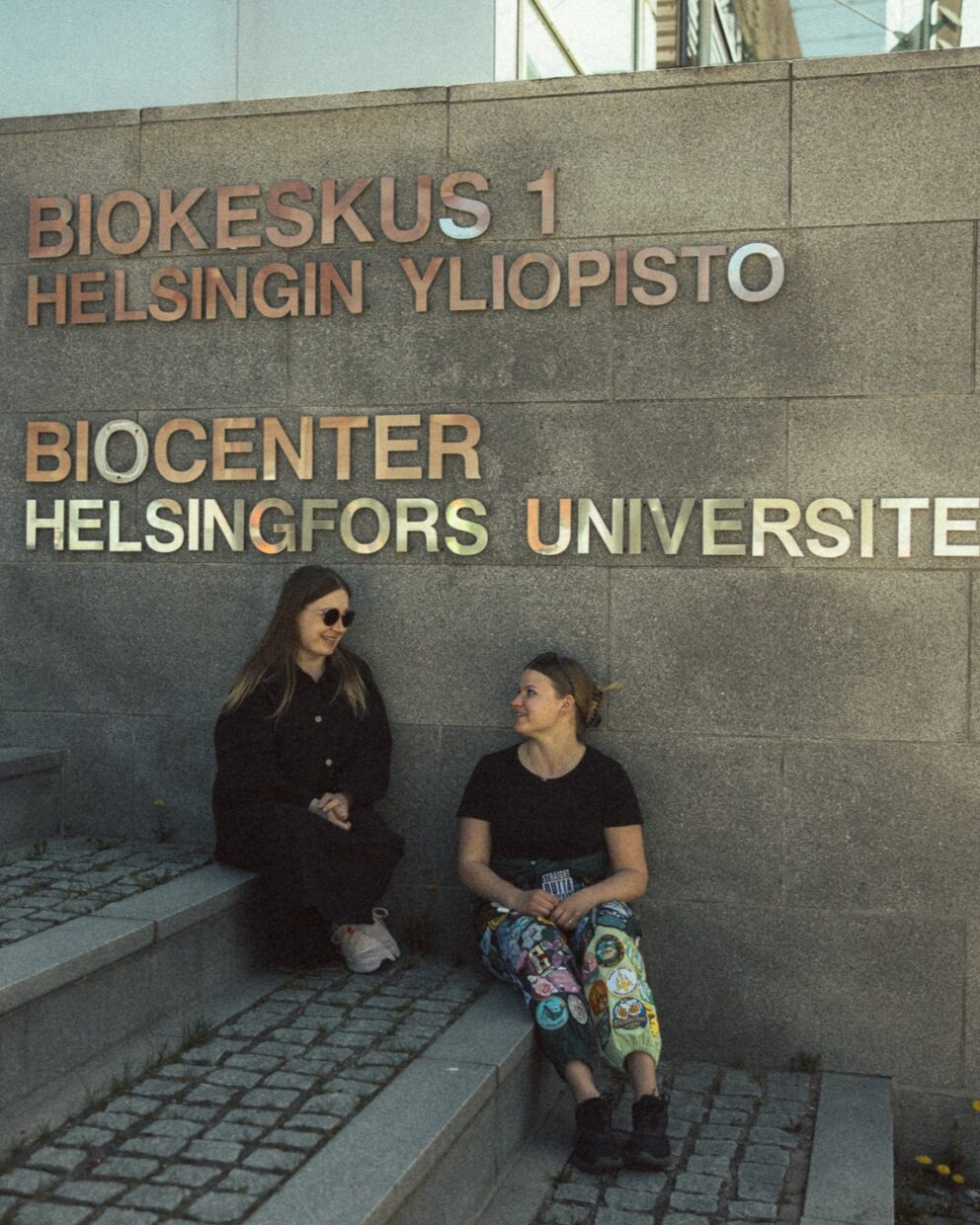

Equality at HYY
Equality means that all human beings are equal regardless of any personal reasons or characteristics, which include gender, age, ethnic and national origin, nationality, language, religion and belief, opinion, disability, health and sexual orientation. Equality is one of the values of our Student Union.
Our key steering documents related to equality are the Equality Plan and the Policy Paper. The Equality Plan guides our internal operation in relation to organisations operating under us, for instance. The Policy Paper, on the other hand, describes our policies as relevant to the advocacy work we conduct towards the University and society.
We support the organisations operating under us and encourage them to take equality into account as well as create a safer atmosphere for all students. Organisations’ activities may not conflict with our Equality Plan. We organise training events annually on different aspects of equality and have also drafted equality instructions for organisations. Organisations can also borrow a portable induction loop.
We provide the organisations operating under us with different facilities they can use. The New Student House and Domma both have facilities for organising meetings, parties, academic dinner parties and sauna evenings. Information on the accessibility of our premises is available here.
-
-
Principles of safer space
HYY’s principles of safer space apply to our activities and events. With our principles, we aim to create practices that help everyone promote a safer and more equal environment.
-
-
- Treat other people in a civil, respectful manner and appreciate their work contributions. Do not, for instance, make inappropriate or dismissive comments about other people or launch personal attacks on them.
- When giving feedback, focus on giving constructive feedback and be prepared to engage in a dialogue.
- We all have various assumptions and prejudices about other people. Try to identify the assumptions you make and to take the diversity of people into account. Respect the self-defined identities of other people and face them with an open mind, as you cannot know another person’s background, experiences or situation in life, nor can you define their identity for them.
- There is no room for violence, harassment, racism or discriminatory behaviour or language in HYY.
- Respect the bodily and mental integrity of other people as well as the boundaries they have set for themselves. No means no – do not harass anyone verbally, by touching them or by staring at them.
- In discussions, ensure that everyone gets heard and is able to participate. In a good discussion, everyone gets the chance to speak, gets heard and can choose to only listen if they prefer. Do not speak over other people and try to use the kind of language that is understandable to everyone.
- Deal with delicate subjects respectfully and use content warnings if needed. Content warnings refer to a note stating that the subject under discussion includes material that may shock or offend some people.
- Recognise your own privileges. Privileges refer to advantages that individuals have by virtue of belonging to certain social groups. Privileges may be related to characteristics including gender, sexual orientation, skin colour, class, language, health status and religion.
- If you violate the principles of safer space or if someone points out that you have done so, apologise. Everyone makes mistakes. Be understanding towards mistakes made by others, too, and try to resolve the matter between the involved parties, if possible.
- Take action against any discrimination you witness or offer your support to the people who encounter discrimination. In problem situations, you can also contact the persons in charge of event safety and/or HYY’s harassment contact persons.
Help and support for harassment situations
HYY has two harassment contact persons who offer support to HYY’s members who have encountered harassment, bullying, discrimination or any other kind of inappropriate treatment. Organisations operating under HYY may also consult the harassment contact persons in harassment cases. Any contacts with the harassment contact persons are entirely confidential, and the harassment contact persons are under an obligation of secrecy.
The harassment contact persons offer advice on processing the situation and, if needed, support you with taking the matter forward. They can, for instance, help you find the right parties to contact or create a plan of action, or they can facilitate discussion between different parties. In cases involving University personnel, we will also include the University’s harassment contact persons in the process. No case will be taken forward unless you want to do so.
The harassment contact persons are not judges or officials – they are a neutral party helping you process the situation. They do not punish the person accused of harassment or resolve the situation for you. The accused also has the right to be heard. A successful contact requires you to be active and prepared to discuss the matter. Contacting a harassment contact person does not replace the potential need to seek professional help either. If you are worried about your coping in the situation, please contact the FSHS or some other help provider. When there is suspicion of a crime having been committed, please always contact the police, too.
You can reach both harassment contact persons by email at hairintayhdyshenkilo@hyy.fi
Tiia Niemi, tiia.niemi@hyy.fi, 050 543 9608
Janne Kajander, janne.kajander@hyy.fi, 050 543 9609
You can also report harassment using the harassment report form. You can report anonymously, but please note that the harassment contact persons will not be able to take any further measures based on anonymous reports. However, your report will be taken into account for statistical purposes and for the development of our operation.
If the person harassing you is a staff member at the University, you can also contact the University’s harassment contact persons:
Timo Valtonen, timo.valtonen@helsinki.fi
Terhi Somerkallio, terhi.somerkallio@helsinki.fi
-
In the context of the harassment contact person activities, harassment refers to inappropriate and undesired behaviour. Harassment may occur through expressions, speech, messages, gestures or touching, for instance.
In legislation, harassment means infringing human dignity in such a way that it creates a degrading or intimidating environment towards another person. Harassment may be related to characteristics including gender, age, origin, nationality, language, religion, belief, opinion, political activity, trade union activity, family relationships, state of health, disability and sexual orientation.
Violating organisations’ principles of safer space or other instructions may also be interpreted as harassment.
All conflict situations between individuals do not automatically constitute harassment or bullying.
-
- Tell the person behaving inappropriately that their behaviour is inappropriate. Tell them that you do not approve of their behaviour and ask them to stop. If you do not dare to approach the person yourself, ask a friend to do so. If the situation is taking place in an organisation’s activities or premises, you can also ask for help from people involved in the organisation.
- If the harassment continues, write down what happened and when, who were present and what was said. Save any possible emails and messages. This will make processing the matter later easier.
- Tell someone about the harassment:
- If the harassment is done by another student in a teaching situation, contact the teacher responsible for the course or another member of staff.
- If the harasser is a member of staff, contact the University’s harassment contact persons.
- If the harassment occurs in a student organisation’s activities or premises, primarily contact the people involved in the organisation in question and, if needed, HYY’s harassment contact persons.
- If the harassment occurs in HYY’s activities or similar situations, you can contact HYY’s harassment contact persons.
- If you suspect that a crime has been committed, always contact the police.
- If you need discussion help, you can also contact the FSHS or some other help provider. You can seek help from the party you feel is the most natural for yourself.
-
Each harassment situation is different, so we will look for the measures that best suit the situation. Below is an example of how the process could proceed in some situations.
- To begin with, the harassment contact persons will discuss the incident and your wishes for resolving the situation with you. All further measures will be taken on your terms. If you wish, a resolution to the matter will not be sought, and all discussions will remain between you and the harassment contact person. Depending on the situation, the harassment contact person may also direct you to another party.
- Depending on the situation, the harassment contact persons will next contact the person accused of harassment, if possible. They also have the right to be heard and state their own view of the situation.
- After this, the harassment contact persons may proceed in the following ways, for instance:
- The harassment contact persons discuss the matter separately with both parties. Sometimes, this may be enough, and the matter is resolved.
- Sometimes, people involved in organisations are included to investigate the incident if the situation took place in an organisation’s events or premises.
- In certain cases, the harassment contact persons may invite the parties to a joint meeting. The purpose of such a meeting is to give the parties the opportunity to discuss what happened and possibly find a resolution that suits them both. The harassment contact persons support and facilitate this discussion.
- Please note that it is not always possible to find a simple resolution that satisfies everyone to every situation.

Equality at the University
The key equality actor at the University of Helsinki is the Equality and Diversity Committee. The composition of the committee includes the vice rector in charge of equality, the University’s equality advisor and two student representatives. The committee is in charge of promoting equality at the University through the University’s Equality and Diversity Plan, for instance. Do not hesitate to contact members of the committee if you want to influence the realisation of equality at the University!
The accessibility of studies is supported by individual arrangements – practical arrangements used to facilitate smooth study progress. You may require such arrangements due to dyslexia or a sensory disability, for instance. The realisation of the arrangements is determined based on your situation and needs. The arrangements may entail, for instance, receiving lecture material in advance, additional time for returning an assignment or an alternative completion method.
There are both equality and accessibility liaisons operating at the University. You can contact them on a low threshold on any matters related to equality or accessibility, and their contact details can be found here.